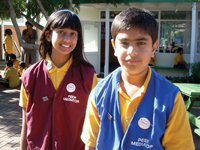

<p><img class=" alignright size-full wp-image-266" style="margin: 5px; float: right;" src="http://schoolnewsnz.fastrackdev.com/wp-content/uploads/2012/02/SN_16_-_Anti_Bullying.jpg" alt="SN 16 - Anti Bullying" width="200" height="150" />The physical and emotional distress caused by school bullying has been in the media spotlight in recent months, particularly in a case where a mother intervened after her daughter was attacked,</p>
<p> <!--more--> </p>
<p>and faced police charges because of it. The psychological wounds from such conflicts can cut deeply and last a life time – or worse. While new laws may help combat cyber attacks, there is heavy onus on school decision makers to actively tackle the problem.</p>
<p>A number of anti-bullying programmes exist covering restorative justice, peer support and sexual harassment, but perhaps the best known organisation offering help to schools is the Peace Foundation with its Cool Schools programmes. This organisation has long established ties with many New Zealand primary and secondary schools with its programmes.</p>
<p>Christina Barruel, Cool Schools national trainer, says its programmes are not promoted specifically as anti-bullying. &#8220;We say it provides awareness and practical skills for students and teachers to manage conflict constructively. It helps develop clear and strong messages that the school is a safe place and action is being taken to keep it that way.</p>
<p>&#8220;It also supports a safe &#8216;telling&#8217; culture in schools. We give students the skills to become role models, to have the confidence to promote good interpersonal relationships with other students, and the ability to refer peers to the appropriate adults where the situation requires,&#8221; she said.</p>
<p>&#8220;In our training of both teachers and students, we raise awareness of how people act in conflict situations. We teach lifelong conflict management skills which empower individuals to make positive choices towards peaceful conflict resolution. We like to think of it as a tool box of skills available to use when differences arise with others. We give constructive skills to students, teachers and parents to help them make positive choices when dealing with conflict scenarios.</p>
<p>&#8220;We train students to be peer mediators. We regard it as a leadership role where they are giving service to others in promoting respect for diversity and making themselves available to talk to students when conflict issues arise. We find students will talk to other students they trust if they have a problem. Peer mediators can be doing lots of other positive work in the school as well.</p>
<p>&#8220;Our peaceful conflict resolution &#8216;tool box&#8217; is for parents as well as students and teachers. Our parents&#8217; programme teaches parents to communicate effectively. We empower individuals to believe they can make a positive difference in their homes, schools, communities and beyond,&#8221; Ms Barruel said.</p>
<p>The Cool Schools Programme was trialled in 12 Auckland primary schools in 1991 by the co-founder, Yvonne Duncan. Christina Barruel says the trial was such a success that Mrs Duncan was offered a full time job as national Cool Schools co-ordinator for The Peace Foundation. Since then over half of New Zealand primary, intermediate and secondary schools have been introduced to the programme</p>
<p>Ms Barruel says there has been a substantial amount of positive feedback from students, teachers, programme coordinators and principals. &#8220;The most popular feedback is that it empowers students to work with other students in areas where they have problems. Students at all levels say they love being in a position where they have the skills to help other students. It gives them a feeling of confidence and helps raise their own self esteem.&#8221;</p>
<p>Training is often tailored to the needs of the school. For instance, with secondary schools, it involves a trainer coming in for 4.5 hours and working with the students selected to be &#8216;the ambassadors of social justice&#8217; or &#8216;peer mediators&#8217; and the key teachers supporting the programme in the school. The trainer then facilitates a staff meeting to build awareness of the programme so teachers know how to effectively support the student peer mediators. &#8220;They are also learning skills for both personal and professional use. At primary level the most effective training is a Teacher Only Day where teachers cover all 10 learning areas and have the understanding and confidence at the end of the day to teach these skills to their classes.&#8221;</p>
<p>The Peace Foundation office is in Auckland with Christina Barruel the trainer for predominantly the Auckland and Northland areas. All areas of the country are covered by The Peace Foundation&#8217;s other five trainers. Interested schools can either contact the Peace Foundation&#8217;s office directly on (09) 373 2379 or look on its website: <a href="http://www.peace.net.nz" target="_blank">www.peace.net.nz</a> </p>

NZEI Te Riu Roa is considering legal action against the government for the disestablishment of…
NZQA is implementing AI-marking for all Year 10 written assessments from this year onwards, following…
Teaching personal financial responsibility isn't enough. Children should be taught broader economic context, argue New…
When students can't hear the teacher, they can't learn properly. Sound quality matters in education…
The Garden City is rich with learning opportunities, no matter what subject or part of…
Teaching Council of Aotearoa launch school leaders’ stories project with Unteach Racism to challenge institutional…
This website uses cookies.